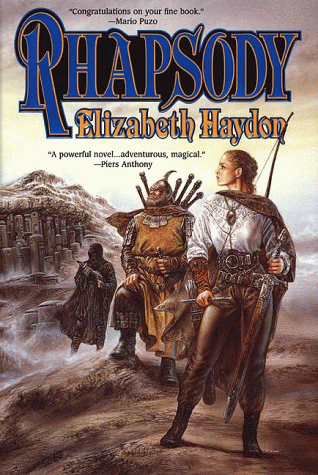
Honesty time: I didn't finish this book. But it wasn't the book's fault. It was just a bad week for trying to get into a fantasy novel. (I could blame my cold, planning for my bachelorette party, a weird work schedule... oh, I guess I just did.) Especially considering I have a tough time getting into fantasy novels in the first place.
But for all that, this is a book to get excited about. I mean, look at the cover; there's a female in full-coverage fighting-type garb in the foreground. She isn't in a glorified metallic bikini and stilettos. She isn't purple. She's holding a weapon and looking ready to kick some fantasy ass.
One thing I do like from what I managed to read of this book is the cast. There aren't so many characters you don't know what to do with them. (As much as I love them, I don't think The Hobbit really required that many dwarves. They didn't have the opportunity to be fleshed out, and they didn't even serve as body shields... you know, characters you carry around so there can be a dramatic death scene that doesn't kill anyone important.) I know who's there, why they're there, and what they're doing at any given point. And - another problem I tend to have while reading fantasy - I can handle their names. (Don't get me started on Tolkien's elf lore.) They aren't distractingly complex names designed to make the characters feel more exotic. (Side note: This is obviously relative to the culture of the reader. "Rhapsody" and "Emily" and "Grunthor" and "Achmed" are easier names for me to deal with than, perhaps, a reader who grew up with an Asiatic language. But that's a discussion for another time.)
This one goes on my "I'll come back to this and finish it another time" pile, definitely. I liked what I did read, and the only reason I didn't finish was a time crunch issue.
I read this book in high school after it was recommended to me by no less than four people. And with good reason. It's got a strong female lead (Rhapsody), who can hold her own. Does she travel with two male companions? Yes, but we learn early on this is after living on the streets, being a prostitute to survive, only to come out on top as a Namer (which sounds dumb, but is actually SUPER respected in this universe.)
I really love the character development in this. For instance, Rhapsody didn't start the book knowing how to wield a sword. The whole time they're traveling underground (which I didn't realize the first time through, is actually YEARS. I mean... years, upon years, upon years), she is being taught by her companions, who DO know how to fight. She learns their language in this time and they learn to read and write.
Like Alex mentioned, it has just the right amount of characters. Achmed, Rhapsody and Grunthor are there throughout the series. And, to be honest, we only gain one or two significant characters between book one and three. It's a pretty low-key cast, which I like. (Dear George R.R. Martin: Please take a hint and maybe give me a few less people.) It makes it easier to really get into the characters.
There are a LOT of fantasy books out there, and some are better than others, but Rhapsody has one that has managed to migrate from my 16 year old self and hold up against my 27 year old self.
But for all that, this is a book to get excited about. I mean, look at the cover; there's a female in full-coverage fighting-type garb in the foreground. She isn't in a glorified metallic bikini and stilettos. She isn't purple. She's holding a weapon and looking ready to kick some fantasy ass.
One thing I do like from what I managed to read of this book is the cast. There aren't so many characters you don't know what to do with them. (As much as I love them, I don't think The Hobbit really required that many dwarves. They didn't have the opportunity to be fleshed out, and they didn't even serve as body shields... you know, characters you carry around so there can be a dramatic death scene that doesn't kill anyone important.) I know who's there, why they're there, and what they're doing at any given point. And - another problem I tend to have while reading fantasy - I can handle their names. (Don't get me started on Tolkien's elf lore.) They aren't distractingly complex names designed to make the characters feel more exotic. (Side note: This is obviously relative to the culture of the reader. "Rhapsody" and "Emily" and "Grunthor" and "Achmed" are easier names for me to deal with than, perhaps, a reader who grew up with an Asiatic language. But that's a discussion for another time.)
This one goes on my "I'll come back to this and finish it another time" pile, definitely. I liked what I did read, and the only reason I didn't finish was a time crunch issue.
I read this book in high school after it was recommended to me by no less than four people. And with good reason. It's got a strong female lead (Rhapsody), who can hold her own. Does she travel with two male companions? Yes, but we learn early on this is after living on the streets, being a prostitute to survive, only to come out on top as a Namer (which sounds dumb, but is actually SUPER respected in this universe.)
I really love the character development in this. For instance, Rhapsody didn't start the book knowing how to wield a sword. The whole time they're traveling underground (which I didn't realize the first time through, is actually YEARS. I mean... years, upon years, upon years), she is being taught by her companions, who DO know how to fight. She learns their language in this time and they learn to read and write.
Like Alex mentioned, it has just the right amount of characters. Achmed, Rhapsody and Grunthor are there throughout the series. And, to be honest, we only gain one or two significant characters between book one and three. It's a pretty low-key cast, which I like. (Dear George R.R. Martin: Please take a hint and maybe give me a few less people.) It makes it easier to really get into the characters.
There are a LOT of fantasy books out there, and some are better than others, but Rhapsody has one that has managed to migrate from my 16 year old self and hold up against my 27 year old self.












































